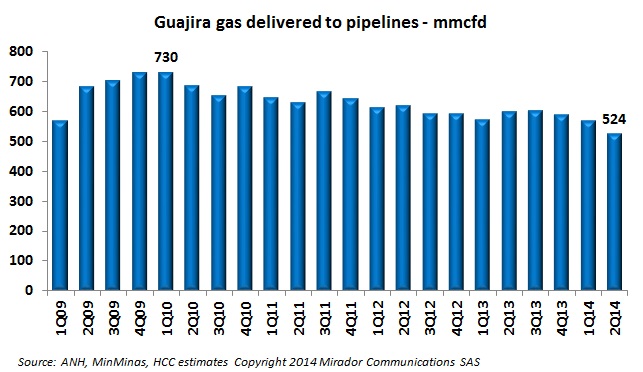
Regional governors, industry associations and congressional leaders have sounded the alarms on rate increases on natural gas that are planned for the Caribbean coast for 2015. Critics say the rise will amount to a 25% increase and effect both thermal generators and home consumers.

Security and Public OrderThe count increased to 41 this week, at recent and above long-term averages.
Colombians will not see a drop in prices at the pump for gasoline and diesel since politicians will tack on excess taxes to compete for lost oil fiscal revenue, which the union says is illegal.
With only days before the next meeting of Ecopetrol’s (NYSE:EC) board of directors, rumors abound that current president Javier Gutiérrez is on his way out, but who would replace him?
The Colombian Petroleum Association (ACP) broke ranks with other business association on an ongoing negotiation on tax reforms over the impact of the CREE surcharge, which ACP president Francisco Lloreda said will lead to a long term impact on E&P activities.
Army General Rubén Darío Alzate is back at home and after a few speed bumps, the talks will restart on December 10th. But the incident has left a scar on the talks, and questions persist about how the commander became the first general to fall into the hands of the Farc.
Ecopetrol (NYSE:EC) says that it has made a discovery of an accumulation of natural gas at its Orca-1 well in the offshore Tayrona block, the first discovery in the deep waters of the Colombian Caribbean.

Ecopetrol (NYSE:EC) announced hiring trends of its contractors over the last three months, and said that of the nearly 30,000 posts generated, 90% of them went to local labor.
Pacific Rubiales (TSX:PRE) announced their 2015 outlook, which looks to slash costs, facilitate cash flow and brace for a lower oil price. The main target is Mexico, where the company also announced a joint venture with Mexican investment group ALFA to develop projects in that market.
A constitutional reform stalls in the Senate, while the number of critics of the royalty system in Colombia’s congress grows, with a number of lawmakers taking a harsher tone against the national government. These and other royalty related stories in our periodic summary.